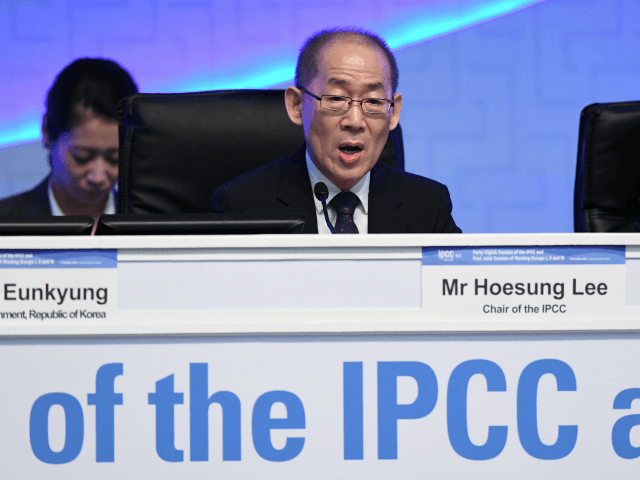The Intergovernmental Panel on Climate Change (IPCC) has issued its latest Summary for Policy Makers – and it’s the usual farrago of dubious science, wailing hysteria and worryingly eco-fascistic policy prescriptions.
- Sea levels are rising. [As they have been, by the way, at the same harmless pace, for centuries]
- The crisis is so dire that even if all the countries stick to their Paris Accord commitments, it still won’t be enough to stop the planet heating by 2 degrees C or more.
- Drastic lifestyle changes must be made, drastic carbon emissions cuts must be implemented to stave off further disaster
- $2.4 trillion must be spent by 2035 on sustainable energy projects such as wind and solar
- Climate-related risks to health, livelihoods, food security, water supply, human security, and economic growth are projected to increase as the planet warms
- Vector borne diseases such as malaria and dengue fever will likely increase
One observer – Benny Peiser of the Global Warming Policy Foundation – describes it as the IPCC’s “Hail Mary”: its last, desperate shot at trying to scare a world which just doesn’t care any more.
The reason increasingly few of us believe all “last chance to save the planet” stuff is first that we’ve heard it too many times before, secondly that it hasn’t been supported by real-world evidence and thirdly because thanks to the internet and sites like this we’re all better informed.
Take that line on vector borne diseases. Anyone who has been following this saga knows that this claim was debunked years ago by the expert in the field Paul Reiter.
As far back as 1998, Reiter gave a lecture on this subject to the Cooler Heads Coalition:
All attempts to link specific recent outbreaks to climate change cannot survive a confrontation with the facts. In all cases, local conditions (such as the banning of DDT, land use changes, or foreign contact) account for expansions of disease vectors or increases in infection rates.
Yet here is the IPCC, trotting out the same old same old as if no one’s paying attention.
What is new, or new-ish, is the IPCC’s fairly frank acknowledgement that the Paris Climate Accord was a failure.
Admittedly, it says it in a rather less comprehensible way, viz:
D1. Estimates of the global emissions outcome of current nationally stated mitigation ambitions as submitted under the Paris Agreement would lead to global greenhouse gas emissions18 in 2030 of 52–58 GtCO2eq yr-1 (medium confidence). Pathways reflecting these ambitions would not limit global warming to 1.5°C, even if supplemented by very challenging increases in the scale and ambition of emissions reductions after 2030 (high confidence). Avoiding overshoot and reliance on future large-scale deployment of carbon dioxide removal (CDR) can only be achieved if global CO2 emissions start to decline well before 2030 (high confidence).
But that, essentially, is what that verbiage means.
Even if all the signatories of the Paris Accord stick to their emissions reductions targets, it still won’t be enough to stop the planet from warming above what the IPCC considers to be the beginning of the danger zone: a rise of 1.5 degrees C above pre-industrial levels.
Here’s the thing, though: as we learned from yesterday’s bombshell study the IPCC doesn’t even know for certain what those pre-industrial temperature levels were nor how much they have risen since. That’s because the temperature data sets used by the IPCC are bunk: they have been manipulated by incompetents and activists.
That 1.5 degrees C target is also an entirely fabricated artefact. It was devised by a hard-left green activist called Joachim Schellnhuber who simply plucked it from the air.
What’s also new about this particularly IPCC bulletin is its shameless promotion of the renewable energy industry.
As Rupert Darwall argues in his book Green Tyranny this was always the real purpose of the global warming scare: the “science” was really just a pretext, devised by ideological Euro Greenies, to destroy the fossil fuel hegemony of countries like the U.S. and to impose on them a new, eurocentric, renewable energy global tyranny.
But in the past, the IPCC has been a bit reluctant to push this message so blatantly.
Now, here it is, urging us to spend $2.4 trillion on this problem for whose existence it has provided no evidence.
As Benny Peiser says: “The IPCC looks as if it has reinvented itself as the world’s biggest renewable energy lobby.”
Will anyone notice or care, though?
Not outside the usual globalist circles, one suspects.
The BBC, the Guardian, the New York Times, WaPo, CNN and the other usual suspects have been pushing this one hard.
What’s encouraging, though, is how many outlets haven’t taken the bait.
Witness this hilarious toys-out-of-the-pram display from Alan Rusbridger, formerly the editor of the Guardian, now the head of an Oxford college, as he bewails the lack of interest in the IPCC report.
Gosh, could it be, Alan that in some corners of the media universe – not the ones you were involved in, obviously – a few vestiges of the old standards still prevail? That maybe some editors still recognise a complete non-story when they see one?

COMMENTS
Please let us know if you're having issues with commenting.